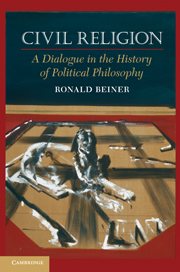Book contents
- Frontmatter
- Contents
- Preface and Acknowledgments
- Introduction
- Part I Machiavelli, Hobbes, Rousseau
- 1 Rousseau's Problem
- 2 The Machiavellian Solution
- 3 Moses and Mohammed as Founder–Princes or Legislators
- 4 Refounding and “Filiacide”
- 5 The Hobbesian Solution
- 6 Behemoth
- 7 Geneva Manuscript
- 8 Social Contract
- Part II Responses to (and Partial Incorporations of) Civil Religion within the Liberal Tradition
- Part III Theocratic Responses to Liberalism
- Part IV Postmodern “Theism”
- Conclusion
- Index
- References
7 - Geneva Manuscript
The Apparent Availability of a Rousseauian Solution
Published online by Cambridge University Press: 05 June 2012
- Frontmatter
- Contents
- Preface and Acknowledgments
- Introduction
- Part I Machiavelli, Hobbes, Rousseau
- 1 Rousseau's Problem
- 2 The Machiavellian Solution
- 3 Moses and Mohammed as Founder–Princes or Legislators
- 4 Refounding and “Filiacide”
- 5 The Hobbesian Solution
- 6 Behemoth
- 7 Geneva Manuscript
- 8 Social Contract
- Part II Responses to (and Partial Incorporations of) Civil Religion within the Liberal Tradition
- Part III Theocratic Responses to Liberalism
- Part IV Postmodern “Theism”
- Conclusion
- Index
- References
Summary
Public instruction no longer exists and can no longer exist, because where there is no longer fatherland, there can no longer be citizens. These two words, fatherland and citizen, should be effaced from modern languages. I know well the reason why this is so, but I do not want to tell it.
– Jean-Jacques RousseauIn Chapter 1, we saw that in the first thirty paragraphs of the Social Contract's penultimate chapter, Rousseau offers the following analysis of politically relevant religious possibilities:
There may be politics without a civil religion, which he rejects.
There may be “pure” Christianity, which he religiously accepts but politically rejects.
There may be corrupted Christianity, which contests the sovereign's claim to undivided political authority – which is very forcefully rejected. (The chief instance is Catholicism, but Rousseau refers also to Shintoism and Tibetan Buddhism.)
There may be monotheistic theocracy, which is either (a) conquering and proselytizing (Islam), or (b) simply conquering, or genocidal (Judaism) – both of which are rejected.
There may be what one might call “benign theocracy,” or a fairly tolerant national religion, namely paganism, especially Roman paganism, for which Rousseau feels evident sympathy but which he nonetheless rejects (perhaps with regret!) as historically anachronistic.
Finally, Rousseau switches in the final five paragraphs of the chapter to a very different possibility – a predominantly liberal civil religion that, as we saw in Chapter 1, somehow simply floats above this analytic framework. (One may rightly observe how strange it is that Rousseau chooses to offer such a liberal conclusion to a rather illiberal book.) Yet in the Geneva Manuscript (an earlier version of the Social Contract), Rousseau flirted with an additional possibility, tacitly dropped in the definitive version of his treatise on politics, which we might call a distinctively Protestant civil religion. Rousseau writes, “Experience teaches that of all the Christian sects, Protestantism, as the wisest and gentlest, is also the most peaceful and social. It is the only one in which the laws can maintain their dominion and the leaders their authority.” Here Rousseau refers to Protestant Christianity as a “social” sect, whereas in the definitive version of his teaching on civil religion, he devotes the central analysis of the chapter to demonstrating that it is of the very essence of Christianity to be “contrary to the social spirit” [“Je ne connais rien de plus contraire à l'esprit social.”]. Why is the Protestant option dropped? Now of course it may have been the case that Rousseau, as a Swiss Protestant, was (and for good reason) deeply fearful of French Catholicism, and that the “purely civil profession of faith,” the nameless (and rather anemic) religion described at the end of the chapter, is the only politically viable way of plumping for Protestantism in the midst of a religiously intolerant Catholic culture. This is certainly a possible way of reading what Rousseau is up to in the concluding paragraphs of the Social Contract. I, however, do not think this interpretation does full justice to the deep philosophical tensions that are at work in Rousseau's thinking. As Roger Masters's acute observation in an editorial note makes clear, Rousseau's political philosophy is incompatible with the Christian idea of universal benevolence. As a Christian, Rousseau ought to have embraced the sort of secularized Christian universalism exemplified by Diderot, but Rousseau's political principles (in opposition to Diderot) steer him in a decidedly particularist (“pagan”) direction. In fact, as Masters rightly points out, Rousseau takes himself to have refuted what he refers to, in Book 1, chapter 2 of the Geneva Manuscript, as “the gentle laws of brotherhood,” rejecting them as placing unrealistic expectations on human nature. Because universal brotherhood is not to be hoped for, the best politics would strive to enlarge individual self-concern into a kind of collective selfishness (“my interest” becomes fused with “the interest of the polis”), and in a way it is precisely this at which the Rousseauian general will aims. Exactly in the spirit of Edmund Burke, Rousseau condemns that phony cosmopolitanism that allows individuals to “boast of loving everyone in order to have the right to love no one.” On the other hand, Rousseau, unlike Machiavelli, has by no means broken with the Christian spirit of universal human brotherhood, as his sharp attack on the “national religions” in the civil-religion chapter makes perfectly evident. We are left with an unbridgeable tension between Christian universalism and pagan parochialism. If Rousseau is alive to this tension, as he certainly is in the Social Contract, then Protestantism (contrary to what Rousseau had seemed to suggest at the end of the Geneva Manuscript) cannot be a sustainable civic option.
- Type
- Chapter
- Information
- Civil ReligionA Dialogue in the History of Political Philosophy, pp. 73 - 77Publisher: Cambridge University PressPrint publication year: 2010



